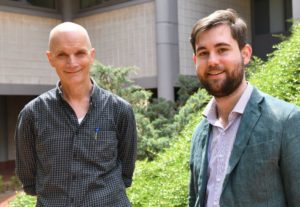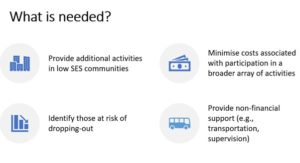
Organised sport, dance and drama after school and on weekends give children an advantage and headstart for the rest of their lives. But these opportunities are not always available or adequate to meet higher needs in low-income suburbs and families, according to new research led by Flinders University.
An extended study, led by Flinders University researchers Dr Alexander O’Donnell and Professor Gerry Redmond, is calling on policy-makers, governments and corporate bodies to subsidise more extra-curricular opportunities for less privileged young people who are often denied opportunities vital for their development.

“Our research so far shows that youth in poorer suburbs are almost three times more likely to miss out on activities compared to youth in more affluent areas – but they are the ones most likely to benefit from participation,” says Dr O’Donnell, an expert in developmental psychology at Flinders University.
“Already there are large educational disparities across suburbs, with youth in more affluent areas typically performing better than others. However there are reasons to believe that participation in organised activities can help reduce these differences by helping out more disadvantaged youth.”
Organised out-of-school activities can help young people form friendships and social connections which can help them adjust to schooling life, the research found. n turn, these relationships at school can promote better mental health and improved educational outcomes, Dr O’Donnell says.
Flinders University sociologist and social policy analyst, Professor Redmond, says this is one of several important issues to highlight during Anti-Poverty Week (17-20 October 2021).
“We know that ongoing engagement in organised activities, particularly outside of school hours, can really improve the life chances for more disadvantaged young people, but their rates of participation tend to be much lower,” says Professor Redmond, who leads the national ARC-funded Social Exclusion in Adolescence project.
“Various states and territories have introduced voucher schemes and other programs to support extra-curricular activities, but there is a growing need to provide more support to expand opportunities for all young people,” Professor Redmond says.
“This means making voucher schemes more generous, expanding the range of activities they can be used for, and increasing awareness of the schemes so that more young people, especially young people in low-income communities, take advantage of them.”
 The new findings to be presented at next week’s Australian Social Policy Conference (25 October to 5 November). Anti-Poverty Week executive director Toni Wren emphasises at least 940,000 children are growing up in families struggling to survive on income security payments below the poverty line – or nearly one in five of all Australian children aged from birth to 14 years.
The new findings to be presented at next week’s Australian Social Policy Conference (25 October to 5 November). Anti-Poverty Week executive director Toni Wren emphasises at least 940,000 children are growing up in families struggling to survive on income security payments below the poverty line – or nearly one in five of all Australian children aged from birth to 14 years.
The Flinders University researchers say the South Australian ‘Playford 10’ community program, with support from a number of charitable organisations, offers a range of extra-curricular activities to 10-year-old children in local City of Playford schools to “develop their life skill capability”.
Children are given the opportunity to access activities from music and creative arts to sport and volunteering, with these activities also helping to build trusted relationships with mentors and role models.


Brother and sister Mitchal and Makayla, pictured right, have been introduced to tennis via the program. Mitchal’s mother, Rosie Whinfield, says Playford 10 program gave her children an opportunity to do an out-of-school activity for the first time.
“I didn’t have this kind of opportunity when I grew up, so it’s wonderful to see my children start playing tennis with Playford 10 and now join a tennis club,” she says.
“My son is a totally different boy since starting Playford 10. He gets up on his own, is the first one ready every Saturday morning and is progressing through skills levels at tennis.
“He’s also concentrating more and staying in class more at school. It has had a positive impact on our whole family.”
The findings of Flinders University’s ‘The Longitudinal Effects of Adolescent Extracurricular Activity Participation on School Belonging and Peer Relations: The Moderating Role of Socioeconomic Status’ study include:
- Young people from low-income suburbs are much more likely to miss out on extracurricular activities compared with high-income families and suburbs (34% compared with 13%). This is mainly due to the cost of activities; availability and cost of public transportation; and lack of facilities, clubs and programs in many low-income suburbs.
- Participation in extracurricular activities like sport, dance, and drama can significantly reduce the differences in school engagement and academic performance between young people living in high and low-income suburbs
- Participation in extracurricular activities allows young people in socioeconomically disadvantaged areas to increase their school belonging through the development of stronger interpersonal ties with their peers.
- This is because participation in extracurricular activities can improve feelings of connection to their friends and increased school belonging.
- The research found young people in low-income suburbs who engage in extracurricular activities have increased school belonging. In high income suburbs, participation in extra-curricular activities has no discernible effect on school belonging.
Professor Redmond and Dr O’Donnell also reviewed the main supports for families to participate in extracurricular activities which are vouchers issued by States and Territories. They found
- They don’t cover the cost of most activities.
- They are mostly only available for sports and recreation, not arts, music or other activities in most States and Territories.
Helen Connolly, Anti-Poverty Week co-chair and Commissioner for Children and Young People, South Australia, says education is “more than simply sitting in a classroom with the ‘essential’ core items and materials at your fingertips. It’s about having the full range of opportunities and experiences that make up a ‘school life’ available to you.”
“While at school, many of what are often described as non-essential costs are essential to children and young people’s sense of belonging, friendship and learning. In a school environment, some markers of poverty are more visible than others,” Ms Connolly says, pointing to a new report entitled Spotlight on the True Cost of Education.
“Regardless, the short term and long term social, economic, emotional and educational impacts of ‘missing out’ don’t only affect educational engagement and achievement, but also personal relationships, health and future aspirations.
“Understanding the impact that cumulative essential, non-essential, and hidden costs of going to school have on low-income families and committing to addressing these inequalities is the only way to ensure that no South Australian child or young person is left ‘outside’ the full education experience to which they are entitled.”
Read more in The Conversation – ‘The kids who’d get the most out of extracurricular activities are missing out – here’s how to improve access‘

